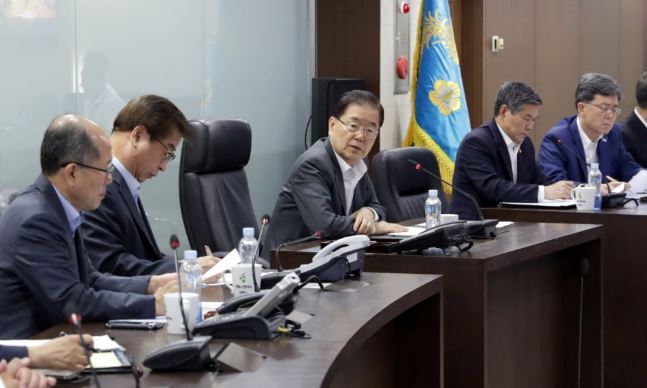National Security Council convened as GSOMIA nears end
By Choi He-sukPublished : Nov. 21, 2019 - 16:49
Top South Korean officials on Thursday continued reviewing Korea-Japan issues, with the looming expiration of the military intelligence sharing agreement with Japan.
On Thursday, the National Security Council was convened, raising speculations that Seoul’s decision on the General Security of Military Information Agreement with Japan was likely to have topped the agenda.
On Thursday, the National Security Council was convened, raising speculations that Seoul’s decision on the General Security of Military Information Agreement with Japan was likely to have topped the agenda.

GSOMIA is set to expire at midnight Friday following Seoul’s decision to forego the annual renewal in response to Japan’s trade-curbing measures.
Seoul maintains that it will only reconsider its decision to end GSOMIA if Japan withdraws the trade restrictions. Japan, for its part, has shown no signs that it will retract the measures.
Seoul has reportedly reached out to the US to make its position clear.
According to reports, deputy national security adviser Kim Hyun-chong made a three-day trip to the US to convey Seoul’s position on the GSOMIA issue. Reports citing unnamed sources said that Kim met with high-level US officials to discuss related issues.
Although a dramatic turnaround on GSOMIA seems unlikely, President Moon Jae-in has left open room for talks with Japan.
During a televised town hall meeting on Tuesday, Moon said he was willing to work with Japan “until the last minute” if ending GSOMIA could be avoided.
Japan, meanwhile, is also reported to be working to keep the agreement going.
According to Japanese broadcaster NHK, Japanese Prime Minister Shinzo Abe said there is still room for resolving the matter, citing Japanese lawmaker Takeo Kawamura.
The broadcaster also reported that Abe showed interest in a plan suggested by Korean National Assembly Speaker Rep. Moon Hee-sang.
During a recent trip to Tokyo, Rep. Moon proposed creating a fund with contributions from Korean and Japanese corporations and donations from the public to cover the Korean court-ordered compensations for victims of forced labor.
According to the report, Abe commented that moving forward with Rep. Moon’s proposal could be considered if it ensures that the bilateral agreement between Korea and Japan is kept.
Although unclear, Abe’s comment has been interpreted as a reference to the 1965 pact that normalized relations between the two countries, which has formed the basis of Tokyo’s refusal to compensate victims of forced labor.
Tokyo says that the pact covered all compensations due to those who suffered under Japan’s occupation of the Korean Peninsula during the first half of the 20th century.
By Choi He-suk (cheesuk@heraldcorp.com)











![[Today’s K-pop] BTS pop-up event to come to Seoul](http://res.heraldm.com/phpwas/restmb_idxmake.php?idx=644&simg=/content/image/2024/04/17/20240417050734_0.jpg&u=)
![[Graphic News] More Koreans say they plan long-distance trips this year](http://res.heraldm.com/phpwas/restmb_idxmake.php?idx=644&simg=/content/image/2024/04/17/20240417050828_0.gif&u=)





![[KH Explains] Hyundai's full hybrid edge to pay off amid slow transition to pure EVs](http://res.heraldm.com/phpwas/restmb_idxmake.php?idx=652&simg=/content/image/2024/04/18/20240418050645_0.jpg&u=20240419100350)

